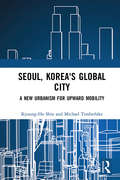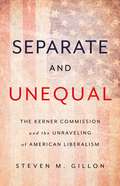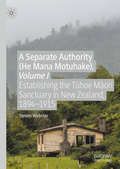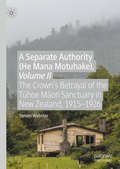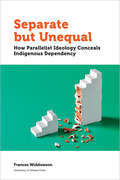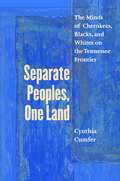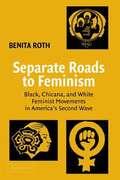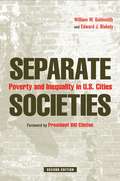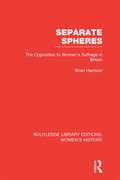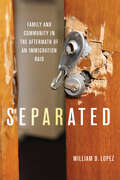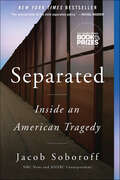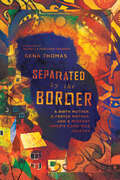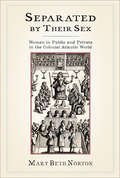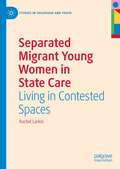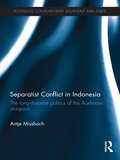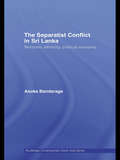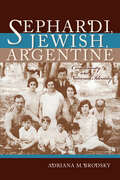- Table View
- List View
Sentinel Under Siege: The Triumphs And Troubles Of America's Free Press
by Stanley E FlinkIf the unexamined life is not worth living, surely the unexamined media is not worth heeding. Sentinel Under Siege traces the evolution of the media in the United States and its capacity to examine and regulate itself, from its earliest colonial roots to the modern explosion of digital technology.Once the Bill of Rights was enacted in 1791, the press became the first and only enterprise explicitly protected by the United States Constitution. This book is concerned with the legal content given to freedom of the press by the Supreme Court, and the fitful attempts of media criticism?both intramural and external?to build a greater sense of responsibility among the practitioners.Stanley Flink, former correspondent of Life Magazine and writer/producer at NBC and CBS, is concerned less with the people's right to know than with the people's need to know. Only a competent, responsible press?whatever its means of distribution?can perform the role of watchdog over official abuse of power, business corruption, and political distortions. But the acquisition of so many newspapers, magazines, and broadcasting facilities by corporate conglomerates threatens a new kind of prior restraint on an independent press?the conflicts of interest; the power of advertising; the unspoken self-censorship of reporters and editors, print or electronic, based on the perceived predilections of their employers; and the financial interests of related companies.Flink believes that responsible journalism can also be economically viable in the twenty-first century because the mass communication of reliable news reporting and media accountability will be vital to the democratic process. Unless the news media persistently seeks the high moral ground of public service, the first casualty will be an informed electorate. The second may well be constitutional protection.
Seoul Book of Everything: Everything You Wanted to Know About Seoul and Were Going to Ask Anyway (Book Of Everything Ser.)
by Tim LehnertYour key to the South Korean city&’s neighborhoods, green spaces, and urban design, as well as its history, museums, pop culture, shopping, and more. From ancient royal palaces and Korean traditional houses to all-night markets, N Seoul Tower, and the club scene, no city combines the ancient and the contemporary quite like Seoul. Local experts weigh in on one of the world&’s most dynamic cities, including contributions from Robert Neff, Tracey Stark, Daniel Gray, Kim Young-sook, Joel Levin, Michael J. Meyers, and Mary Crowe. A comedian details the five things you must bring to Korea, a food writer picks five favorite restaurants, and a prominent meteorologist provides the low-down on Seoul&’s climate. You&’ll also find insider takes on local mountains and ghosts, as well as movies, tea houses, night spots, the economy, cultural treasures, essential reads, Buddhist shrines, and Seoul&’s amazing postwar evolution. From the DMZ, the Han River, and Cheonggyecheon Stream to navigating local dining, linguistics, and cultural practices, this completely updated reference will become your go-to book on the &“Land of the Morning Calm.&”
Seoul, Korea's Global City: A New Urbanism for Upward Mobility
by Kyoung-Ho Shin Michael TimberlakeSeoul, as one of Asia’s rising global cities, has been a place where enormous changes in politics, industry, and culture have taken place over the last five decades. This book explores the new urbanism in Seoul from the perspective of global political economy, focusing on the contexts in which the city has witnessed the transformation of its population structure, such as the rise of the global urban middle class and the city’s increased nodal function in commodity chains. The burgeoning signs of Seoul’s status as a global city are discussed in terms of transnational tourism and the frequency of study abroad, the immigrant community, and cross-border cultural flows. Examining the labour structures within the city, economic growth policy, the role of advanced information technology, and neoliberal urban development, the authors also examine the local response in the city to its emerging status. A study of the development of the Korean capital and its deep embeddedness in the world economy, Seoul, Korea’s Global City will appeal to scholars of sociology, geography and economics with interests in political economy, urban studies and Asian studies.
Separate and Dominate
by Christine Delphy David BroderAn examination of how mainstream feminism has been mobilized in support of racist measuresFeminist Christine Delphy co-founded the journal Nouvelles questions féministes with Simone de Beauvoir in the 1970s and became one of the most influential figures in French feminism. Today, Delphy remains a prominent and controversial feminist thinker, a rare public voice denouncing the racist motivations of the government's 2011 ban of the Muslim veil. Castigating humanitarian liberals for demanding the cultural assimilation of the women they are purporting to "save," Delphy shows how criminalizing Islam in the name of feminism is fundamentally paradoxical. Separate and Dominate is Delphy's manifesto, lambasting liberal hypocrisy and calling for a fluid understanding of political identity that does not place different political struggles in a false opposition. She dismantles the absurd claim that Afghanistan was invaded to save women, and that homosexuals and immigrants alike should reserve their self-expression for private settings. She calls for a true universalism that sacrifices no one at the expense of others. In the aftermath of the Charlie Hebdo massacre, her arguments appear more prescient and pressing than ever.From the Trade Paperback edition.
Separate and Unequal: The Kerner Commission and the Unraveling of American Liberalism
by Steven M. GillonThe definitive history of the Kerner Commission, whose report on urban unrest reshaped American debates about race and inequalityIn Separate and Unequal, historian Steven M. Gillon offers a revelatory new history of the National Advisory Commission on Civil Disorders--popularly known as the Kerner Commission. Convened by President Lyndon Johnson after riots in Newark and Detroit left dozens dead and thousands injured, the commission issued a report in 1968 that attributed the unrest to "white racism" and called for aggressive new programs to end discrimination and poverty. "Our nation is moving toward two societies," it warned, "one black, and one white--separate and unequal."Johnson refused to accept the Kerner Report, and as his political coalition unraveled, its proposals went nowhere. For the right, the report became a symbol of liberal excess, and for the left, one of opportunities lost. Separate and Unequal is essential for anyone seeking to understand the fraught politics of race in America.
A Separate Authority (He Mana Motuhake), Volume I: Establishing the Tūhoe Māori Sanctuary in New Zealand, 1894–1915
by Steven WebsterThis book is an ethnohistorical reconstruction of the establishment in New Zealand of a rare case of Maori home-rule over their traditional domain, backed by a special statute and investigated by a Crown commission the majority of whom were Tūhoe leaders. However, by 1913 Tūhoe home-rule over this vast domain was being subverted by the Crown, which by 1926 had obtained three-quarters of their reserve. By the 1950s this vast area had become the rugged Urewera National Park, isolating over 200 small blocks retained by stubborn Tūhoe "non-sellers". After a century of resistance, in 2014 the Tūhoe finally regained statutory control over their ancestral domain and a detailed apology from the Crown.
A Separate Authority (He Mana Motuhake), Volume II: The Crown’s Betrayal of the Tūhoe Māori Sanctuary in New Zealand, 1915–1926
by Steven WebsterFollowing on from Volume I on the formation of the Urewera District Native Reserve, this monograph examines the period from 1908 to 1926, during which time the Crown subverted Tūhoe control of the UDNR, established a mere decade earlier. While Volume I described how the Tūhoe were able to deploy kin-based power to manipulate Crown power as well as confront one another, this volume describes ways in which the same ancestral descent groups closed ranks to survive nearly two decades of predatory Crown policies determined to dismantle their sanctuary. A relentless Crown campaign to purchase individual Tūhoe land shares ultimately resulted in a misleading Crown scheme to consolidate and relocate Tūhoe land shares, thereby freeing up land for the settlement of non- Tūhoe farmers. By the 1950s, over 200 small Tūhoe blocks were scattered throughout one of the largest National Parks in New Zealand. Although greatly weakened by these policies in terms of kinship solidarity as well as land and other resources, Tūhoe resistance continued until the return of the entire park in 2014—with unreserved apologies and promises of future support. In both volumes of A Separate Authority (He Mana Motuhake), Webster takes the stance of an ethnohistorian: he not only examines the various ways control over the Urewera District Native Reserve (UDNR) was negotiated, subverted or betrayed, and renegotiated during this time period, but also focuses on the role of Māori hapū, ancestral descent groups and their leaders, including the political economic influence of extensive marriage alliances between them. The ethnohistorical approach developed here may be useful to other studies of governance, indigenous resistance, and reform, whether in New Zealand or elsewhere.
Separate Beds: A History of Indian Hospitals in Canada, 1920s-1980s
by Maureen K. LuxSeparate Beds is the shocking story of Canada's system of segregated health care. Operated by the same bureaucracy that was expanding health care opportunities for most Canadians, the "Indian Hospitals" were underfunded, understaffed, overcrowded, and rife with coercion and medical experimentation. Established to keep the Aboriginal tuberculosis population isolated, they became a means of ensuring that other Canadians need not share access to modern hospitals with Aboriginal patients.Tracing the history of the system from its fragmentary origins to its gradual collapse, Maureen K. Lux describes the arbitrary and contradictory policies that governed the "Indian Hospitals," the experiences of patients and staff, and the vital grassroots activism that pressed the federal government to acknowledge its treaty obligations.A disturbing look at the dark side of the liberal welfare state, Separate Beds reveals a history of racism and negligence in health care for Canada's First Nations that should never be forgotten.
Separate but Unequal: How Parallelist Ideology Conceals Indigenous Dependency (Politics and Public Policy)
by Frances WiddowsonSeparate but Unequal provides an in-depth critique of the ideology of parallelism—the prevailing view that Indigenous cultures and the wider Canadian society should exist separately from one another in a “nation-to-nation” relationship. Using the Final Report of the Royal Commission on Aboriginal Peoples as an example, this historical and material analysis shows how the single-minded pursuit of parallelism will not result in a more balanced relationship between Indigenous and non-Indigenous peoples. On the contrary, it merely restores archaic economic, political, and ideological forms that will continue to isolate the Indigenous population. This book provides an alternative framework for examining Indigenous dependency. This new perspective—the political economy of neotribal rentierism—shows that Indigenous Peoples’ circumstances have been inextricably linked to the development of capitalism in Canada. While Indigenous Peoples were integral participants in the fur trade, the transition from mercantilism to industrial capitalism led to their marginalization. This book is published in English. - Separate but Unequal fournit une analyse approfondie de l’idéologie du parallélisme – la vision dominante selon laquelle les cultures autochtones et la société canadienne en général devraient vivre séparément les unes des autres dans une relation de nation à nation. En s’appuyant sur le rapport final de la Commission royale sur les peuples autochtones, cette analyse historique et matérielle montre que les propositions parallélistes visant à accroître l’autonomie des Autochtones dans tous les aspects des politiques publiques ne se solderont pas en une relation plus équilibrée entre peuples autochtones et non autochtones, étant donné qu’elles ne font que rétablir des formes économiques, politiques et idéologiques archaïques qui continueront d’isoler la population autochtone. Elle propose de recadrer la question de la dépendance autochtone en ayant recours à la notion de rentiérisme néotribal. Ce cadre d’économie politique met en lumière le fait que les conditions des peuples autochtones ont été inextricablement liées au développement du capitalisme au Canada. Ce livre est publié en anglais.
Separate Destinations
by James G. GimpelNatives who change residence do not settle in the same places as immigrants. Separate Destinationsargues that these distinct mobility patterns, coupled with record levels of immigration from impoverished third world nations, are balkanizing the American electorate. James G. Gimpel examines the consequences of different patterns of movement and settlement on the politics of the communities in which these different groups settle. Newer immigrants are con-strained by a lack of education, money, English literacy, and information--and frequently by discrimination--to live in areas of coethnic settlement. Domestic, native-born migrants--predominantly Caucasian--free of discrimination and possessing more money and information, move where they wish, often to communities where immigrants are not welcome or cannot afford to live. Strong evidence suggests that spatially isolated immigrants are slower to naturalize and get involved in politics than domestic migrants. Gimpel looks closely at states with very different patterns of migration and immigration: California, Colorado, Kansas, Kentucky, Florida, Pennsylvania, and New York. In these states, Gimpel shows the impact of population mobility on party registration, party votes, and voter turnout and asks whether population changes have changed the dominant party in a state or produced a political reaction from natives. Separate Destinationscontains a number of thematic maps detailing the settlement patterns of internal migrants and immigrants for both counties and census tracts. Blending insights from a number of social science disciplines, including economics, demography, sociology, political science, and anthropology, this book will be of interest to a wide and diverse readership of scholars, students, and policymakers. James G. Gimpel is Associate Professor of Government, University of Maryland.
Separate Peoples, One Land
by Cynthia CumferExploring the mental worlds of the major groups interacting in a borderland setting, Cynthia Cumfer offers a broad, multiracial intellectual and cultural history of the Tennessee frontier in the Revolutionary and early national periods, leading up to the era of rapid westward expansion and Cherokee removal. Attentive to the complexities of race, gender, class, and spirituality, Cumfer offers a rare glimpse into the cultural logic of Native American, African American, and Euro-American men and women as contact with one another powerfully transformed their ideas about themselves and the territory they came to share. The Tennessee frontier shaped both Cherokee and white assumptions about diplomacy and nationhood. After contact, both groups moved away from local and personal notions about polity to embrace nationhood. Excluded from the nationalization process, slaves revived and modified African and American premises about patronage and community, while free blacks fashioned an African American doctrine of freedom that was both communal and individual. Paying particular attention to the influence of older European concepts of civilization, Cumfer shows how Tennesseans, along with other Americans and Europeans, modified European assumptions to contribute to a discourse about civilization, one both dynamic and destructive, which has profoundly shaped world history.
Separate Roads To Feminism: Black, Chicana, And White Feminist Movements In America's Second Wave
by Benita RothThis book is about the development of white women's liberation, black feminism and Chicana feminism in the 1960s and 1970s, the era known as the "second wave" of U. S. feminist protest. Benita Roth explores the ways that feminist movements emerged from the Civil Rights/Black Liberation movement, the Chicano movement, and the white left, and the processes that supported political organizing decisions made by feminists. She traces the effects that inequality had on the possibilities for feminist unity and explores how ideas common to the left influenced feminist organizing.
Separate Schools: Gender, Policy, and Practice in Postwar Soviet Education (NIU Series in Slavic, East European, and Eurasian Studies)
by E. Thomas EwingStarting in 1943, millions of children were separated into boysÆ and girlsÆ schools in cities across the Soviet Union. The government sought to reinforce gender roles in a wartime context and to strengthen discipline and order by separating boys and girls into different classrooms. The program was a failure. Discipline further deteriorated in boysÆ schools, and despite intentions to keep the education equal, girlsÆ schools experienced increased perceptions of academic inferiority, particularly in the subjects of math and science. The restoration of coeducation in 1954 demonstrated the power of public opinion, even in a dictatorship, to influence school policies.In the first full-length study of the program, Ewing examines this large-scale experiment across the full cycle of deliberating, advocating, implementing, experiencing, criticizing, and finally repudiating separate schools. Looking at the encounters of pupils in classrooms, policy objectives of communist leaders, and growing opposition to separate schools among teachers and parents, Ewing provides new insights into the last decade of StalinÆs dictatorship. A comparative analysis of the Soviet case with recent efforts in the United States and elsewhere raises important questions. Based on extensive research that includes the archives of Uzbekistan and Kazakhstan, Separate Schools will appeal to historians of Russia, those interested in comparative education and educational history, and specialists in gender studies.
Separate Societies: Poverty and Inequality in U.S. Cities, Second Edition
by Goldsmith William W. Blakely Edward J.“Economic and political forces no longer combat poverty—they generate poverty!" exclaim William Goldsmith and Edward Blakely in their report on the plight of American's urban poor. In this revised and updated edition of their 1992 book Separate Societies, the authors present a compelling examination of the damaging divisions that isolate poor city minority residents from the middle-class suburban majority. They pay special attention to how the needs of the permanently poor have been unmet through the alternating years of promises and neglect, and propose a progressive turn away from 30 years of conservative policies. Separate Societiesvividly documents how the urban working class has been pushed out of industrial jobs through global economic restructuring, and how the Wall Street meltdown has aggravated underemployment, depleted public services, and sharpened racial and class inequalities. The authors insist that the current U. S. approach puts Americans out of work and lowers the standard of living for all. As such, Goldsmith and Blakely urge the Obama administration to create better urban policy and foster better metropolitan management to effectively and efficiently promote equality.
Separate Spheres: The Opposition to Women's Suffrage in Britain (Routledge Library Editions: Women's History)
by Brian HarrisonThe British feminist movement has often been studied, but so far nobody has written about its opponents. Dr Harrison argues that British feminism cannot be understood without appreciating the strength and even the contemporary plausibility of ‘the Antis’, as the opponents of women’s suffrage were called. In a fully documented approach which combines political with social history, he unravels the complex politics, medical, diplomatic and social components of the anti-suffrage mind, and clarifies the Antis’ central commitment to the idea of separate but complementary spheres for the two sexes. Dr Harrison then analyses the history of organised anti-suffragism between 1908 and 1918, and argues that anti-suffragism is important for shedding light on the Edwardian feminists. The Antis also introduce us to important Victorian and Edwardian attitudes which are often forgotten and which differ markedly from the attitudes to women which are now familiar; on the other hand, his concluding chapter – which surveys the period from 1918 to 1978 – claims that many of these attitudes, though less frequently voiced in public, still influence present-day conduct. His book, published originally in 1978, therefore makes an important contribution towards the history of the British women’s movement and towards understanding Britain in the nineteenth- and twentieth-centuries.
Separated: Family and Community in the Aftermath of an Immigration Raid
by William D. LopezWilliam D. Lopez details the incredible strain that immigration raids place on Latino communities—and the families and friends who must recover from their aftermath.2020 International Latino Book Awards Winner First Place, Mariposa Award for Best First Book - Nonfiction Honorable Mention, Best Political / Current Affairs BookOn a Thursday in November 2013, Guadalupe Morales waited anxiously with her sister-in-law and their four small children. Every Latino man who drove away from their shared apartment above a small auto repair shop that day had failed to return—arrested, one by one, by ICE agents and local police. As the two women discussed what to do next, a SWAT team clad in body armor and carrying assault rifles stormed the room. As Guadalupe remembers it, "The soldiers came in the house. They knocked down doors. They threw gas. They had guns. We were two women with small children... The kids terrified, the kids screaming."In Separated, William D. Lopez examines the lasting damage done by this daylong act of collaborative immigration enforcement in Washtenaw County, Michigan. Exploring the chaos of enforcement through the lens of community health, Lopez discusses deportation's rippling negative effects on families, communities, and individuals. Focusing on those left behind, Lopez reveals their efforts to cope with trauma, avoid homelessness, handle worsening health, and keep their families together as they attempt to deal with a deportation machine that is militarized, traumatic, implicitly racist, and profoundly violent. Lopez uses this single home raid to show what immigration law enforcement looks like from the perspective of the people who actually experience it. Drawing on in-depth interviews with twenty-four individuals whose lives were changed that day in 2013, as well as field notes, records obtained under the Freedom of Information Act, and his own experience as an activist, Lopez combines rigorous research with moving storytelling. Putting faces and names to the numbers behind deportation statistics, Separated urges readers to move beyond sound bites and consider the human experience of mixed-status communities in the small towns that dot the interior of the United States.
Separated: Inside an American Tragedy
by Jacob SoboroffTHE NEW YORK TIMES BESTSELLER"The seminal book on the child-separation policy." —Rachel MaddowThe award-winning NBC News correspondent lays bare the full truth behind America’s systematic separation of families at the US-Mexico border.Los Angeles Times Book Prize Finalist | American Book Award Winner | American Bar Association's Silver Gavel Award FinalistIn June 2018, Donald Trump’s most notorious decision as president had secretly been in effect for months before most Americans became aware of the astonishing inhumanity being perpetrated by their own government—the deliberate separation of migrant parents and children at U.S. border facilities. Jacob Soboroff was among the first journalists to expose this reality after seeing firsthand the living conditions of the children in custody. His influential series of reports ignited public scrutiny that contributed to the president reversing his own policy and earned Soboroff the Cronkite Award for Excellence in Political Broadcast Journalism and, with his colleagues, the 2019 Hillman Prize for Broadcast Journalism.But beyond the headlines, the complete, multilayered story lay untold. How, exactly, had such a humanitarian tragedy—now deemed “torture” by physicians—happened on American soil? Most important, what has been the human experience of those separated children and parents?Soboroff has spent the past two years reporting the many strands of this complex narrative, developing sources from within the Trump administration who share critical details for the first time. He also traces the dramatic odyssey of one separated family from Guatemala, where their lives were threatened by narcos, to seek asylum at the U.S. border, where they were separated—the son ending up in Texas, and the father thousands of miles away, in the Mojave desert of central California. And he joins the heroes who emerged to challenge the policy, and who worked on the ground to reunite parents with children.In this essential reckoning, Soboroff weaves together these key voices with his own experience covering this national issue—at the border in Texas, California, and Arizona; with administration officials in Washington, D.C., and inside the disturbing detention facilities. Separated lays out compassionately, yet in the starkest of terms, its human toll, and makes clear what is at stake as America struggles to reset its immigration policies post-Trump.
Separated by the Border: A Birth Mother, a Foster Mother, and a Migrant Child's 3,000-Mile Journey
by Gena ThomasIn 2017 five-year-old Julia traveled with her mother, Guadalupe, from Honduras to the United States.
Separated by Their Sex: Women in Public and Private in the Colonial Atlantic World
by Mary Beth NortonIn Separated by Their Sex, Mary Beth Norton offers a bold genealogy that shows how gender came to determine the right of access to the Anglo-American public sphere by the middle of the eighteenth century. Earlier, high-status men and women alike had been recognized as appropriate political actors, as exemplified during and after Bacon's Rebellion by the actions of-and reactions to-Lady Frances Berkeley, wife of Virginia's governor. By contrast, when the first ordinary English women to claim a political voice directed group petitions to Parliament during the Civil War of the 1640s, men relentlessly criticized and parodied their efforts. Even so, as late as 1690 Anglo-American women's political interests and opinions were publicly acknowledged.Norton traces the profound shift in attitudes toward women's participation in public affairs to the age's cultural arbiters, including John Dunton, editor of the Athenian Mercury, a popular 1690s periodical that promoted women's links to husband, family, and household. Fittingly, Dunton was the first author known to apply the word "private" to women and their domestic lives. Subsequently, the immensely influential authors Richard Steele and Joseph Addison (in the Tatler and the Spectator) advanced the notion that women's participation in politics-even in political dialogues-was absurd. They and many imitators on both sides of the Atlantic argued that women should confine themselves to home and family, a position that American women themselves had adopted by the 1760s. Colonial women incorporated the novel ideas into their self-conceptions; during such "private" activities as sitting around a table drinking tea, they worked to define their own lives. On the cusp of the American Revolution, Norton concludes, a newly gendered public-private division was firmly in place.
Separated Migrant Young Women in State Care: Living in Contested Spaces (Studies in Childhood and Youth)
by Rachel LarkinThis book considers the responses of states to migrant girls who are separated from family and enter state care systems as unaccompanied or trafficked young people. The book draws on research with girls and social work practitioners in the UK to explore what can happen when separated girls encounter professionals at borders and within care systems. It considers how separated girls adapt to different ideas of what it means to be a girl in destination countries, and how this is affected by their other intersecting identities. The book identifies how girls can feel welcomed, but also how young migrants can be seen in excluding ways. It argues that narratives of the fragile ‘refugee child’ are unhelpful ways to understand individual girls. Using theories and clear language relevant to both academics and practitioners, the author fills a gap in the research on migrant and trafficked young women who frequently represent the minority in care systems globally.
Separation Revisited: Adolescents in Foster Family Care (Routledge Revivals)
by Celia DownesFirst published in 1992, this book draws on attachment theory to offer a framework for understanding adolescents’ reactions to the experience of being fostered. It discusses the three-way relationship between adolescents, their birth families and their foster families. The experiences of joining a new school or finding work, going missing and returning, and leaving the foster family at the end of the placement are explored. It identifies aspects of family functioning which appear to be helpful or unhelpful to fostered adolescents and considers the functioning of the wider care system and the role of professionals in it. The book is grounded in the day-to-day experiences of twenty-three families who fostered adolescents who would previously have been considered ‘unfosterable’. These experiences were vividly expressed by the adolescents and foster families and provide rich illustrative material.
Separatist Conflict in Indonesia: The long-distance politics of the Acehnese diaspora (Routledge Contemporary Southeast Asia Series)
by Antje MissbachThe socio-political activities of the Acehnese diaspora, located mainly in Malaysia, Scandinavia, the USA and Australia, have been of fundamental importance to conflict and politics within Aceh. The intensity of the relations between the diaspora and the homeland was mainly determined by the conflict that afflicted the region between 1976 and 2005, and the resulting hardship was experienced by Acehnese both at home and abroad. This book looks at more than thirty years of long-distance politics exercised by the Acehnese diaspora both during the conflict and beyond. It interprets the social, political and cultural aspects of the small-scale conflict in Aceh, as well as focusing on the external factors related to the Acehnese overseas and their impact on homeland politics. The book goes on to contribute to the argument that the Acehnese diaspora had a significant impact on those who remained in Aceh. By focusing on the triangular relationships between the homeland, the host countries and the Acehnese diaspora, the book draws attention to the exchange of people, ideas, and financial and material resources that has occurred. It is a useful contribution to Southeast Asian Politics and Diaspora Studies.
The Separatist Conflict in Sri Lanka: Terrorism, ethnicity, political economy (Routledge Contemporary South Asia Series)
by Asoka BandarageThe book provides a detailed historically-based analysis of the origin, evolution and potential resolution of the civil conflict in Sri Lanka over the struggle to establish a separate state in its Northern and Eastern provinces. This conflict between the Sri Lankan government and the secessionist LTTE (Liberation Tigers of Tamil Eelam) is one of the world’s most intractable contemporary armed struggles. The internationally banned LTTE is considered the prototype of modern terrorism. It is known to have introduced suicide bombing to the world, and recently became the first terrorist organization ever to acquire an air force. The ‘iron law of ethnicity’ – the assumption that cultural difference inevitably leads to conflict – has been reinforced by the 9/11 attacks and conflicts like the one in Sri Lanka. However, the connections among ethnic difference, conflict, and terrorism are not automatic. This book broadens the discourse on the separatist conflict in Sri Lanka by moving beyond the familiar bipolar Sinhala versus Tamil ethnic antagonism to show how the form and content of ethnicity are shaped by historical social forces. It develops a multipolar analysis which takes into account diverse ethnic groups, intra-ethnic, social class, caste and other variables at the local, regional and international levels. Overall, this book presents a conceptual framework useful for comparative global conflict analysis and resolution, shedding light on a host of complex issues such as terrorism, civil society, diasporas, international intervention and secessionism.
Separatist Violence in South Asia: A comparative study (Routledge Studies in South Asian Politics)
by Matthew J. WebbSince decolonization began in the late 1940s, a series of often lengthy and destructive separatist insurgencies have imposed severe financial, economic and human costs upon the states of South Asia. Whereas previous analyses of these conflicts have typically focussed upon the parent state or separatist group as the relevant unit of analysis, this book adopts a broader framework, arguing that separatism cannot be understood in isolation from the concept of state sovereignty. This book explores the motives, tactics, successes and failures of South Asia’s separatist movements by deconstructing sovereignty into its constituent components and offers an explanation for why separatism, but not political violence, has recently declined in the region. Taking a comparative explanatory viewpoint, it offers a comprehensive review of relevant explanatory theories dominant in the scholarly literature on separatism and an examination of their application to the South Asian states of India, Pakistan, Sri Lanka and Bangladesh. As a thought-provoking discussion of statehood and sovereignty, this book will be of interest to students of political theory, comparative politics, international relations and South Asian politics.
Sephardi, Jewish, Argentine: Community and National Identity (Sephardi And Mizrahi Studies)
by Adriana M. Brodsky“A much-needed monograph on the role of Sephardic Jews in Argentina, and . . . an important contribution to the study of Jews in Latin America overall” (Choice).At the turn of the twentieth century, Jews from North Africa and the Middle East were called Turcos (“Turks”). Seen as distinct from Ashkenazim, Sephardi Jews weren’t even identified as Jews. Yet the story of Sephardi Jewish identity has been deeply impactful on Jewish history across the world. Adriana M. Brodsky follows the history of Sephardim as they arrived in Argentina, created immigrant organizations, founded synagogues and cemeteries, and built strong ties with coreligionists around the country.Brodsky demonstrates how fragmentation based on areas of origin gave way to the gradual construction of a single Sephardi identity. This unifying identity is predicated both on Zionist identification (with the State of Israel) and “national” feelings (for Argentina), and that Sephardi Jews assumed leadership roles in national Jewish organizations once they integrated into the much larger Askenazi community.Rather than assume that Sephardi identity was fixed and unchanging, Brodsky highlights the strategic nature of this identity, constructed both from within the various Sephardi groups and from the outside, and reveals that Jewish identity must be understood as part of the process of becoming Argentine.


